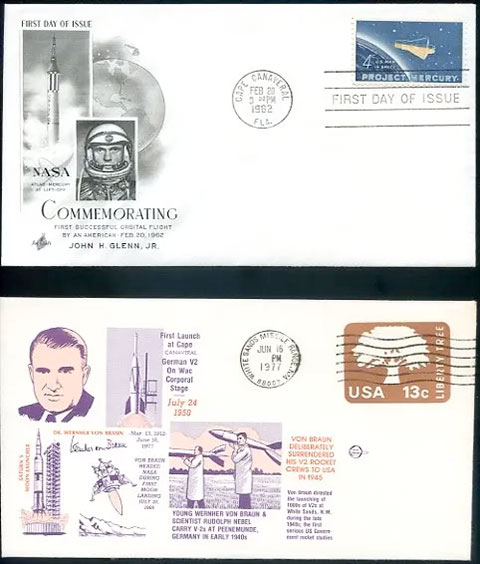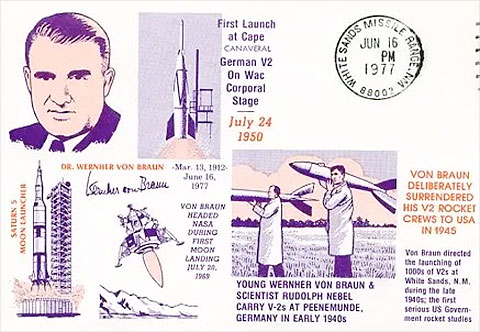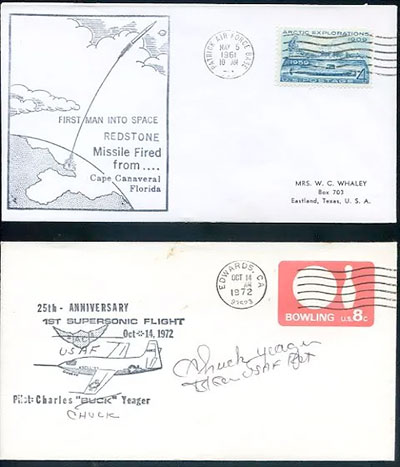|
|

|
|
Author
|
Topic: Space Cover 159: Space Cover Cachet Errors
|
Bob M
Member Posts: 1777
From: Atlanta-area, GA USA
Registered: Aug 2000
|
 posted 04-28-2012 12:12 PM
posted 04-28-2012 12:12 PM
   
Space Cover of the Week, Week 159 (April 29, 2012) 
Space Cover #159: Space Cover Cachet ErrorsWhile the many space cover servicers and cachet makers of days gone by routinely created accurate and factual cacheted covers, mistakes and errors did happen, and this week's Space Cover of the Week presentation will exhibit a few of the more obvious and interesting cachet errors. But first, we want to say that the many space cover and cachet makers have done a splendid job and it is rare to find any error or mistake in a space cover cachet, however... The top cover shown above is a handsome and well-designed Artcraft FDC for the Project Mercury stamp and shows John Glenn with a rocket. It shouldn't take much study for most any space fan to see what's wrong with this cachet. The next cover is a Robert Rank/Space Voyage cover and is a rare example of his usual well-designed and factual covers. This amazing cover has at least five errors, including stating that Wernher von Braun is carrying a V-2 rocket. The next image shows the cachet in better detail.  Above is a Mercury/Redstone-3 launch cover with a cachet identifying Alan Shepard as the first man into space (we know that he wasn't). The final cover has two errors and both were corrected by the person that the cover/cachet is for: Chuck Yeager. The Ray DeBeau cachet identifies Charles "Chuck" Yeager as "Buck," and also has the X-1 Program managed by NACA. I'm sure that other collectors have covers also having errors. |
micropooz
Member Posts: 1568
From: Washington, DC, USA
Registered: Apr 2003
|
 posted 04-29-2012 03:33 PM
posted 04-29-2012 03:33 PM
   
Here is one that I have to explain away every time I display it. This one is a George Goldey Cachet and George (bless his heart) was never a real stickler for detail. The cover is for Mercury-Atlas 1, an unmanned test in which the Atlas disintegrated 57 seconds after the launch. The Mercury capsule was not equipped with an escape system. The cachet mentions "Capsule Recovered". Well, the Mercury capsule for MA-1 WAS recovered, albeit in many twisted and bent pieces! If you have been to the Kansas Cosmosphere, you have seen what I mean about MA-1's twisted, bent pieces! Two X-15 related covers come to mind as well - sorry I don't even have copies in my collection since they are so off-base. Clyde Sarzin put out beautifully printed X-15 cachets postmarked on June 28, 1963 and Sept. 20, 1963 at Edwards. Unfortunately neither date corresponds to an X-15 flight by the pilot shown on the cachet... |
stevedd841
Member Posts: 296
From: Millersville, Maryland
Registered: Jul 2004
|
 posted 05-03-2012 08:12 PM
posted 05-03-2012 08:12 PM
   
The cover pictured is signed by the second U.S. astronaut to orbit the Earth, Scott Carpenter. He was a little miffed that cachet maker Sokolsky said he only did two orbits of the Earth, May 24, 1962. So he took his black Sharpie and fixed the error! Who said these guys didn't think on their feet! |
yeknom-ecaps
Member Posts: 696
From: Northville MI USA
Registered: Aug 2005
|
 posted 05-26-2012 09:08 PM
posted 05-26-2012 09:08 PM
   
quote:
Originally posted by micropooz:
Clyde Sarzin put out beautifully printed X-15 cachets postmarked on June 28, 1963 and Sept. 20, 1963 at Edwards.
Here is one of the Sarzin X-15 covers that are NOT cancelled on a flight date. |
stevedd841
Member Posts: 296
From: Millersville, Maryland
Registered: Jul 2004
|
 posted 05-27-2012 10:03 AM
posted 05-27-2012 10:03 AM
   
Here is the other Clyde Sarzin X-15 look a like cover not on a flight date mentioned by Pooz.  |
micropooz
Member Posts: 1568
From: Washington, DC, USA
Registered: Apr 2003
|
 posted 05-27-2012 05:24 PM
posted 05-27-2012 05:24 PM
   
Thanks for the images! |
eurospace
Member Posts: 2635
From: Berlin, Germany
Registered: Dec 2000
|
 posted 05-28-2012 05:21 AM
posted 05-28-2012 05:21 AM
   
Did anyone actually name the errors yet? For the von Braun cover, I found the following, just shooting out of the hip and with no research done: - von Braun did not head NASA ever, just the Marshall Space Flight Center
- von Braun did not surrender any V-2s. Just himself and a few members of his teams.
- Obviously von Braun and Nebel did not carry V-2s on their shoulders. Much to big for that.
- Of course, this carrying rockets action based on a famous photo did not happen at Peenemünde, but at the rocket launch site at Berlin Tegel. Also, Nebel never worked at Peenemünde, he was sidelined much earlier.
- The 1st launch of a modified V-2 from Cape Canaveral did not take place in 1950, but earlier.
- White Sands, and thousands of V-2s?
|
Bob M
Member Posts: 1777
From: Atlanta-area, GA USA
Registered: Aug 2000
|
 posted 05-28-2012 05:11 PM
posted 05-28-2012 05:11 PM
   
I was hoping that someone would ask about the errors or list them and Juergen did that very well. Also we need to add to the long list that the German V-2 wasn't on the Wac Corporal stage, but it was the other way around, with the Wac Corporal much smaller than the V-2 and served as a second stage.And certainly 1,000's of V-2's launched at White Sands is incorrect, as less than 100 were launched in the US. And to be very picky, we could also say that it's not standard to use "5" instead of a "V" in naming the Saturn V. And, again, Robert Rank's Space Voyage covers rarely had errors and his covers were well-designed and his cachet information accurate. This cover is a rare example of things gone wrong. |
Ken Havekotte
Member Posts: 3140
From: Merritt Island, Florida, Brevard
Registered: Mar 2001
|
 posted 05-28-2012 07:30 PM
posted 05-28-2012 07:30 PM
   
Actually, the first rocket launch of any kind from Cape Canaveral on July 24,
1950 was in fact a modified German V-2 with an added second stage Army WAC Corporal.So I don't fault Robert Rank for that cachet text, but of course, as Bob pointed out — It was a WAC Corporal atop a V-2, and was known as Bumper 8. Bumper 7, fired from the Cape five days later, was the second launch of a rocket from the Cape's Florida Space Coast. Both V-2s were primarily assembled from captured German parts, with about 20% of each vehicle consisting of U.S. components. Besides Bumper 8 becoming the first rocket launched from Cape Canaveral, then called the Long Range Proving Ground, it wasn't the first rocket engine ignited on Cape soil! It was actually Bumper 7, though, it didn't fly on its first attempt on July 19, 1950. The single V-2 rocket motor ignited but quickly shut down, apparently because moisture caused a fuse to blow in a fuel valve along with a failed related circuit. Bumper 7, therefore, became the first launch "scrub" at the Cape. | |
Contact Us | The Source for Space History & Artifacts
Copyright 2021 collectSPACE.com All rights reserved.

Ultimate Bulletin Board 5.47a
|
|

|
 advertisement advertisement

|


















